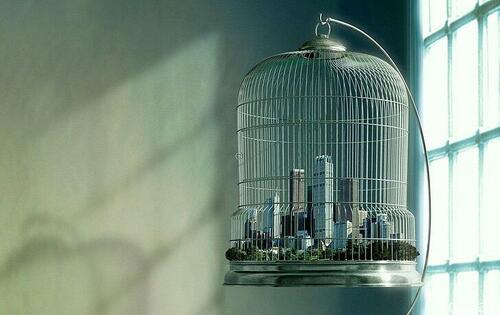Did I forget something? Does it matter at this stage?
Authored by Joel Kotkin via The American Mind,
The only lessons the Old World offers to America these days are cautionary.
Ever since the earliest days of the Republic, American intellectuals, artists, and statesmen looked to Europe for models. Conservatives felt attracted to the continent’s sense of continuity and tradition, and as the base for Christianity. More recently, progressives saw in European social democracy and globalist pacifism a role model to be embraced.
Yet today Europe seems not much of a model for much of anything outside of museums, charming cathedral towns, and terrific food. The notion that Europe represents the future, nurtured by the likes of Mitterrand advisor Jacques Attali, Jeremy Rifkind’s utopian European Dream, and the American journalist T.R. Reid’s 2005 The United States of Europe: The New Superpower and the End of American Supremacy, seem utterly delusional.
A common theme in the early years of the millennium was that Europe was on the verge of global resurgence while America was in decline. Europe’s eventual stagnation, as many conservatives point out, can be in part traced to an ever expanding high-tax welfare state that generally absorbs roughly ten more percentage points of GDP than in the U.S. But this is not the only explanation. Some of the moderately better off European economies, like Denmark and Sweden, are welfare states but manage to outperform the rest.
The real problem is civilizational. Europeans are unwilling to preserve their industrial base and control their borders, leaving the continent increasingly weak and largely defenseless. The leaderless American empire may be creaking, but Europe is in worse shape, hemmed in by dismal demographics, high taxes, suffocating regulation, and an entrenched bureaucracy that makes California seem like a libertarian paradise.
Europe’s decline can be seen in its rapidly shrinking portion of the global economy. It is hard to find any indicator that the continent is gaining global market share as money continues to pour into the U.S. For the last 15 years, European wages have fallen while those in the U.S. have continued to rise; the eurozone economy grew about six percent, measured in dollars, compared with 82 percent for the U.S., according to International Monetary Fund data.
European quality of life is dropping, its industrial base eroding, and there seems little promise of future improvement. Europe now lags in virtually every major advanced industry, from software and space to automobiles. Of the top 50 tech firms only three are located in Europe; the list is dominated largely by the United States with China second. Foreign investment has plummeted and by 2022 accounted for $100 billion less than the U.S.
Much of this decline is self-inflicted, which suggests some valuable lessons for us. A critical problem lies in E.U. climate policy, which has tended to be more extreme, and widely implemented, than in a more divided, decentralized United States. These policies are already eroding food production and sparking higher prices. Developing nations need more food production from exporters, but by Europe’s banning or restricting critical fertilizers, or the enforced culling of herds, they will have to get it elsewhere. This comes at a time when Europe’s old African and South American colonies are losing interest in ties with France and Britain and increasingly look elsewhere, notably China and Russia, for capital, goods, and natural resource development.
Climate catastrophism has also cripped Europe’s energy supply. To meet utopian “net zero” standards, Europe seems, as one observer put it recently, on course for “energy suicide.” The effect of the Ukrainian war has already affected European natural gas prices, but the current conflict is adding more pain. The U.S. is now the world’s biggest liquid natural gas (LNG) exporter while green policies leave Europe ever more exposed. Since October 6, prices at the benchmark TTF gas hub in Holland have soared, selling for about $51 per million Btu. That same quantity of gas at Henry Hub in Louisiana sells for about $2.90. Where will Europe have to turn for future gas supplies? Some Europeans may prefer kowtowing to Qatar, the ally of Iran and Hamas, then bending down to unruly Texans.
The great bastion of European competence, Germany, is clearly unraveling. Germany’s strategy of dependence on U.S. military, Russian energy, and Chinese customers has blown up in their faces, as the U.S. faces defense overstretch, Russian gas heads to China and other more dynamic markets, and the Chinese, once seen as ideal customers for high-end German engineered products, are becoming both reluctant customers and stronger competitors. Germany is now on the verge of losing much of its industrial base, notably in chemicals and autos, including its vaunted mittlestand, in large part due to high energy prices and a diminishing workforce.
German industry must now cope with tech products and electric vehicles built in the world’s leading GHG producer. The power of technology to transform an economy—or leave it behind—also is apparent when comparing the trajectories of Germany and the U.S. over the past 15 years. During that period, the U.S. economy, driven by a boom in Silicon Valley, expanded by 76 percent to $25.5 trillion. Germany’s economy grew by 19 percent to $4.1 trillion. In dollar terms, the U.S. added the equivalent of nearly three Germanys to its economy over that period.
Yet perhaps even more troubling may prove Europe’s experience with immigration. Europe, like the U.S., is swamped with refugees, mainly from destitute countries. Opposition to this unregulated tide—what Le Figaro calls “Le menace islamiste”—is widely dismissed as racist and even criminal. Even before the outbreaks of pro-Hamas sentiment roiled Paris this month, violent protests already had become common and increasingly hostile to the secular state. It is now clear that some of these newcomers have brought with them a strain of Islamic fundamentalism and antisemitism that is far more threatening than anything experienced here.
In the short run, opposition to Israel from the Left, from neo-Marxists to Greens, seems likely to boost the political power of Islamism across Europe, notably in France, while further weakening national as well as European institutions. Across the continent, one sees the growth of ghettos that now contain a permanent underclass who embrace lawless nihilism, compounded by Islamist ideology. European cities were once largely safe and clean but are now dirty and graffiti-scarred, although still less lethally dangerous than their American counterparts. Some cities, like Marseilles, are now better known for random crime and decay than for their Mediterranean charm.
To a long-civilized people used to a degree of civility and respect for law, scenes of French off-duty cops being assaulted are an affront. The increased dominance of large cities by often violent, perennially angry youths, largely from Muslim countries, has the whole continent on edge. Even Sweden, long the Valhalla of progressive fantasies, has been forced to call out the army to tamp down violence in immigrant-dominated areas, where native Swedes are essentially barred.
The opposition to unrestrained immigration has terrible implications for the center-left, whose multicultural ideology in unraveling. The postwar dream that immigrants would relieve the continent of its labor shortages while gradually assimilating to local culture has not panned out. Immigrant workers either lack the skills or cannot penetrate the continent’s often difficult regulatory environment. Even famously liberal countries like Denmark are mandating integration, and openly seek to break up immigrant-dominated clusters by bulldozing social housing.
Immigration is also sparking a powerful right-wing resurgence. Victor Orban, the bete noire of progressive Europe, now has company in the form of Italy’s Giorgia Meloni and perhaps a future President Marine Le Pen. It has also nurtured an upsurge of far-right sentiment in Germany, where refugee populations are soaring.
The rise of the nationalist Right is widely denounced in the media, but it largely represents less expansive chauvinism than a last desperate attempt to restore a semblance of traditional values, notably belief in the past and religion. As the Guardian noted five years ago, a majority of young adults in 12 European countries have no faith; one scholar noted that many young Europeans “will have been baptized and then never darken the door of a church again. Cultural religious identities just aren’t being passed on from parents to children. It just washes straight off them.” According to Pew, for example, Christianity will be the minority faith across Britain and in some other European countries by 2050.
Far more than the U.S., Europe is ill-suited for diversity, as these countries are closely tied to their indigenous population and tradition. The “melting pot,” also under assault in the U.S, never really worked in Europe since the growth of Middle Eastern Muslim immigration. And with extraordinarily low birthrates among indigenous Europeans, these unintegrated populations—the drivers of the current upsurge in antisemitism—will surely grow as a percentage of the population.
If there’s hope it lies in resurgent pushback, both on climate policies in many countries and on unrestricted immigration, both in Germany and on the eastern frontier of the E.U.
Given the struggles in Europe with the consequences of contemporary progressivism, Americans should think twice about adopting their current “solutions.” Without some radical readjustment, Europeans face a dismal future, one that we should not want to replicate on this side of the Atlantic.



